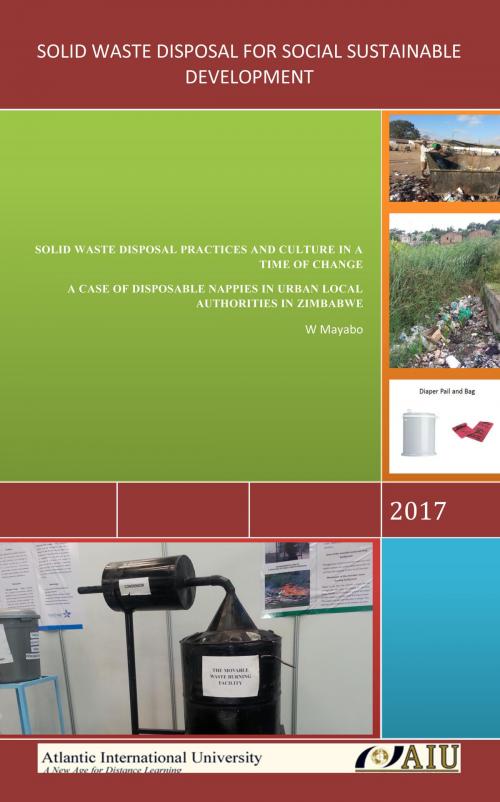Solid Waste Disposal For Social Sustainable Development
Nonfiction, Health & Well Being, Self Help, Self Improvement, Motivational| Author: | W Mayabo | ISBN: | 9781370524839 |
| Publisher: | W Mayabo | Publication: | March 10, 2017 |
| Imprint: | Smashwords Edition | Language: | English |
| Author: | W Mayabo |
| ISBN: | 9781370524839 |
| Publisher: | W Mayabo |
| Publication: | March 10, 2017 |
| Imprint: | Smashwords Edition |
| Language: | English |
Solid Waste Disposal Practices and Culture in a Time of Change- A Case of Disposable Nappies in Urban Local Authorities in Zimbabwe
W. Mayabo
Introduction:
The average per capita waste generation is 0.23 (GIZ waste characterization-Mashonaland West Province towns 2013). There is a characteristic phenomenon of improper disposal of disposable nappies in urban local authorities. The potential generators of this diaper solid waste are women of child bearing age in Zimbabwe. Disposable nappies constitute about 5% of the indiscriminately dumped solid waste. We carried out this study in order to address factors influencing improper disposal of diapers in urban local authorities in Zimbabwe.
Materials and methods: A 1:1 case control study was conducted in Chinhoyi Town. A case was any women of child bearing age attending ANC at health facilities and coming from an area where there are refuse dumps within the visinity. The existance of dumps were within the previous four weeks. Contols were women not exposed to diapers and living in areas without dumps. An interviewer administered questionnaire was used and Epi-info software was used to analyze data.
Results: We enroled 150 respondents from high and low density subburbs. 68% of respondents were exposed to diapers and 32% were not. Majority 77(52%) were 15 to 35 years of age. 112(73%) live in high density and 35(24%) low density suburbs. The risk factors associated with improper refuse disposal were; no instructions on diaper packaging OR 1.9(CI 0.93:3.79), not following disposal instructions OR 3.4(CI 1.67:7.12), using temporary plastic bags OR 2.83(CI 1.15:6.23) and disposal by burying OR 3.25(CI 1.21:8.75)
Discussion and conclusion: Mothers and guardians are responsible for proper disposal of used diapers and all risk facters are centred on behaviour, culture and hygiene practices. Urban authorities should come up with vibrant all inclusive solid waste management protocols that address the existing improper disposal practices.
Key words: Solid waste, diapers, behaviour, culture, disposal, Diarrhoea, zimbabwe
Solid Waste Disposal Practices and Culture in a Time of Change- A Case of Disposable Nappies in Urban Local Authorities in Zimbabwe
W. Mayabo
Introduction:
The average per capita waste generation is 0.23 (GIZ waste characterization-Mashonaland West Province towns 2013). There is a characteristic phenomenon of improper disposal of disposable nappies in urban local authorities. The potential generators of this diaper solid waste are women of child bearing age in Zimbabwe. Disposable nappies constitute about 5% of the indiscriminately dumped solid waste. We carried out this study in order to address factors influencing improper disposal of diapers in urban local authorities in Zimbabwe.
Materials and methods: A 1:1 case control study was conducted in Chinhoyi Town. A case was any women of child bearing age attending ANC at health facilities and coming from an area where there are refuse dumps within the visinity. The existance of dumps were within the previous four weeks. Contols were women not exposed to diapers and living in areas without dumps. An interviewer administered questionnaire was used and Epi-info software was used to analyze data.
Results: We enroled 150 respondents from high and low density subburbs. 68% of respondents were exposed to diapers and 32% were not. Majority 77(52%) were 15 to 35 years of age. 112(73%) live in high density and 35(24%) low density suburbs. The risk factors associated with improper refuse disposal were; no instructions on diaper packaging OR 1.9(CI 0.93:3.79), not following disposal instructions OR 3.4(CI 1.67:7.12), using temporary plastic bags OR 2.83(CI 1.15:6.23) and disposal by burying OR 3.25(CI 1.21:8.75)
Discussion and conclusion: Mothers and guardians are responsible for proper disposal of used diapers and all risk facters are centred on behaviour, culture and hygiene practices. Urban authorities should come up with vibrant all inclusive solid waste management protocols that address the existing improper disposal practices.
Key words: Solid waste, diapers, behaviour, culture, disposal, Diarrhoea, zimbabwe















